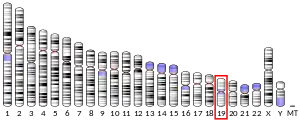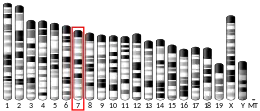GRIK5
Glutamate receptor, ionotropic kainate 5 is a protein that in humans is encoded by the GRIK5 gene.[5][6]
Function
This gene encodes a protein that belongs to the glutamate-gated ionic channel family. Glutamate functions as the major excitatory neurotransmitter in the central nervous system through activation of ligand-gated ion channels and G protein-coupled membrane receptors. The protein encoded by this gene forms functional heteromeric kainate-preferring ionic channels with the subunits encoded by related gene family members.[6]
See also
References
- GRCh38: Ensembl release 89: ENSG00000105737 - Ensembl, May 2017
- GRCm38: Ensembl release 89: ENSMUSG00000003378 - Ensembl, May 2017
- "Human PubMed Reference:". National Center for Biotechnology Information, U.S. National Library of Medicine.
- "Mouse PubMed Reference:". National Center for Biotechnology Information, U.S. National Library of Medicine.
- Szpirer C, Molne M, Antonacci R, Jenkins NA, Finelli P, Szpirer J, Riviere M, Rocchi M, Gilbert DJ, Copeland NG, et al. (January 1995). "The genes encoding the glutamate receptor subunits KA1 and KA2 (GRIK4 and GRIK5) are located on separate chromosomes in human, mouse, and rat". Proc Natl Acad Sci U S A. 91 (25): 11849–53. doi:10.1073/pnas.91.25.11849. PMC 45333. PMID 7527545.
- "Entrez Gene: GRIK5 glutamate receptor, ionotropic, kainate 5".
- Mehta S, Wu H, Garner CC, Marshall J (May 2001). "Molecular mechanisms regulating the differential association of kainate receptor subunits with SAP90/PSD-95 and SAP97". J. Biol. Chem. 276 (19): 16092–9. doi:10.1074/jbc.M100643200. PMID 11279111.
- Garcia EP, Mehta S, Blair LA, Wells DG, Shang J, Fukushima T, Fallon JR, Garner CC, Marshall J (October 1998). "SAP90 binds and clusters kainate receptors causing incomplete desensitization". Neuron. 21 (4): 727–39. doi:10.1016/S0896-6273(00)80590-5. PMID 9808460. S2CID 18723258.
- Wenthold RJ, Trumpy VA, Zhu WS, Petralia RS (January 1994). "Biochemical and assembly properties of GluR6 and KA2, two members of the kainate receptor family, determined with subunit-specific antibodies". J. Biol. Chem. 269 (2): 1332–9. doi:10.1016/S0021-9258(17)42262-9. PMID 8288598.
- Ripellino JA, Neve RL, Howe JR (January 1998). "Expression and heteromeric interactions of non-N-methyl-D-aspartate glutamate receptor subunits in the developing and adult cerebellum". Neuroscience. 82 (2): 485–97. doi:10.1016/S0306-4522(97)00296-0. PMID 9466455. S2CID 23219004.
Further reading
- Kamboj RK, Schoepp DD, Nutt S, et al. (1992). "Molecular structure and pharmacological characterization of humEAA2, a novel human kainate receptor subunit". Mol. Pharmacol. 42 (1): 10–5. PMID 1321949.
- Cauley K, Kukekov V, Young D (1997). "Kainate/AMPA receptors expressed on human fetal astrocytes in long-term culture". J. Neurosci. Res. 47 (3): 311–21. doi:10.1002/(SICI)1097-4547(19970201)47:3<311::AID-JNR9>3.0.CO;2-L. PMID 9039653. S2CID 13044525.
- Porter RH, Eastwood SL, Harrison PJ (1997). "Distribution of kainate receptor subunit mRNAs in human hippocampus, neocortex and cerebellum, and bilateral reduction of hippocampal GluR6 and KA2 transcripts in schizophrenia". Brain Res. 751 (2): 217–31. doi:10.1016/S0006-8993(96)01404-7. PMID 9099808. S2CID 9796632.
- Ripellino JA, Neve RL, Howe JR (1998). "Expression and heteromeric interactions of non-N-methyl-D-aspartate glutamate receptor subunits in the developing and adult cerebellum". Neuroscience. 82 (2): 485–97. doi:10.1016/S0306-4522(97)00296-0. PMID 9466455. S2CID 23219004.
- Garcia EP, Mehta S, Blair LA, et al. (1998). "SAP90 binds and clusters kainate receptors causing incomplete desensitization". Neuron. 21 (4): 727–39. doi:10.1016/S0896-6273(00)80590-5. PMID 9808460. S2CID 18723258.
- Mehta S, Wu H, Garner CC, Marshall J (2001). "Molecular mechanisms regulating the differential association of kainate receptor subunits with SAP90/PSD-95 and SAP97". J. Biol. Chem. 276 (19): 16092–9. doi:10.1074/jbc.M100643200. PMID 11279111.
- Strausberg RL, Feingold EA, Grouse LH, et al. (2003). "Generation and initial analysis of more than 15,000 full-length human and mouse cDNA sequences". Proc. Natl. Acad. Sci. U.S.A. 99 (26): 16899–903. Bibcode:2002PNAS...9916899M. doi:10.1073/pnas.242603899. PMC 139241. PMID 12477932.
- Kohda K, Kamiya Y, Matsuda S, et al. (2003). "Heteromer formation of delta2 glutamate receptors with AMPA or kainate receptors". Brain Res. Mol. Brain Res. 110 (1): 27–37. doi:10.1016/S0169-328X(02)00561-2. PMID 12573530.
- Hayes DM, Braud S, Hurtado DE, et al. (2003). "Trafficking and surface expression of the glutamate receptor subunit, KA2". Biochem. Biophys. Res. Commun. 310 (1): 8–13. doi:10.1016/j.bbrc.2003.08.115. PMID 14511640.
- Kamm C, Leung J, Joseph S, et al. (2004). "Refined linkage to the RDP/DYT12 locus on 19q13.2 and evaluation of GRIK5 as a candidate gene". Mov. Disord. 19 (7): 845–7. doi:10.1002/mds.20095. PMID 15254951. S2CID 20276163.
External links
- GRIK5+protein,+human at the U.S. National Library of Medicine Medical Subject Headings (MeSH)
This article incorporates text from the United States National Library of Medicine, which is in the public domain.
This article is issued from Wikipedia. The text is licensed under Creative Commons - Attribution - Sharealike. Additional terms may apply for the media files.





